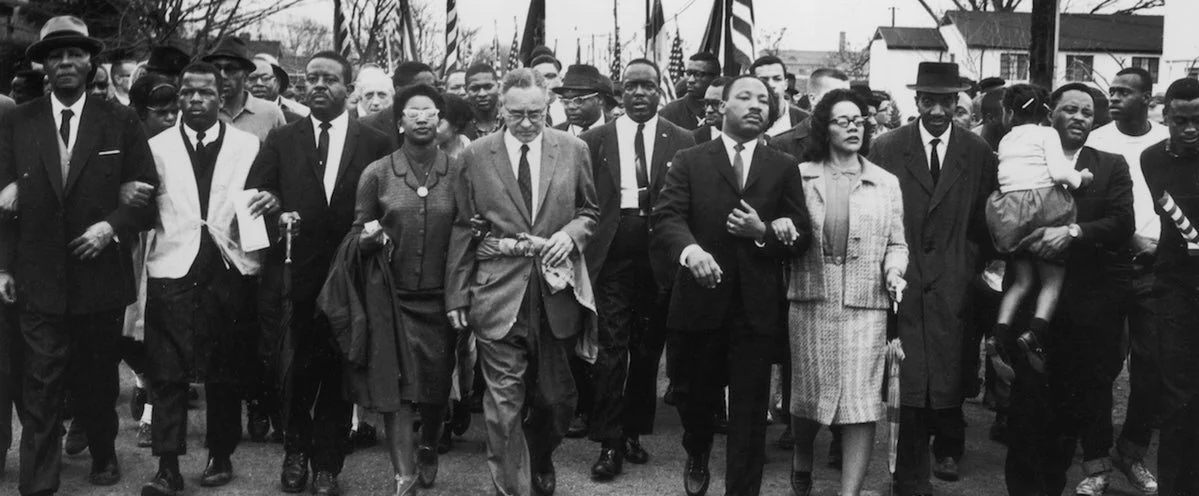By Elissa Barrett, WJC Executive Director
This weekend, I was asked to speak at a virtual gathering with people from around the world – the United States, China, Africa, India, Australia, Canada – and others who had fled to those lands from elsewhere around the globe.
Dr. Ding-jo Currie, former chancellor of Coast Colleges in Orange County, and her husband Mark had gathered us for their monthly Spiritual Dialogues. Together we tuned in, some on Saturday evening, others on Sunday morning. Our conversation was translated simultaneously into Chinese, and our topic was justice, non-violence and how each of us can participate in bending the arc of the moral universe.
“Human progress is never inevitable,” said the Reverend Dr. Martin Luther King. “The hour is late, and the clock is ticking.”
These prescient words come from King’s “The American Dream” speech, delivered from his pulpit at Ebenezer Baptist Church on the Fourth of July, 1965, and performed on this day by Gerald Rivers, an accomplished actor born and raised in Compton, California, who brings King’s speeches to schools and college campuses.
“Most people are only familiar with King’s ‘I Have a Dream’ speech,” said Rivers. “But there is so much more to explore with King, so many ideas that seem as if they are speaking to us now, in this moment.”
“Like what?” asked Dr. Currie. “What would King say to us if he were here today?”
I thought immediately of a line we’d just heard and quoted it aloud: “We are caught in an inescapable network of mutuality, tied in a single garment of destiny – whatever affects one directly, affects us all indirectly.” And I added, “Is there any greater proof of this truth than what we are living through today with COVID? Climate change? The resurgence of white supremacy?”
Dr. King would also call us to exercise our power for the advancement of justice, as he did in his speech, “Where Do We Go from Here?” delivered at the 11th Convention of the Southern Christian Leadership Conference on August 16, 1967, in Atlanta, Georgia.
“There is nothing wrong with power if power is used correctly. [O]ne of the great problems of history is that the concepts of love and power have usually been contrasted as opposites, polar opposites, so that love is identified with a resignation of power, and power with a denial of love. What is needed is a realization that power without love is reckless and abusive, and that love without power is sentimental and anemic. Power at its best is love implementing the demands of justice, and justice at its best is power correcting everything that stands against love. [T]his is what we must see as we move on.”
“But what about extreme acts of violence?” wondered someone in the Zoom chat. “How do we practice non-violence in those circumstances?”
Good question. How should we respond to acts of violence – great acts of violence, like the ones we saw on January 6th in our nation’s Capitol? What about smaller acts of violence, like the aggressions we carry out against each other in our homes, our schools or our communities? How do we respond in these cases?
For the answer, I reflected on a conversation that I’d had days earlier with our talented team of conflict-resolution teachers here at WJC.
“We have to look at the roots of violence and conflict in our society. We have to talk about white supremacy and the infrastructure of violence, a system of laws, policies and practices that allows the exercise of privilege without accountability,” said one member of our team.
“We have to hold people accountable for their actions. Reconciliation and healing cannot happen without ownership,” responded another. “You don’t heal a deep wound by covering it up. The infection keeps growing beneath the surface. The poison spreads.”
Another member of the team weighed in: “Okay. So we hold people accountable. They go to jail. Then what? What if we sat in this question: ‘What are the rioters afraid of?’ Isn’t that what we teach our students, to listen with an open heart so they can shift from defending their position to experiencing empathy? Look, as Black people, we get it. We’ve been on the receiving end for hundreds of years. But if we cannot find humanity in each other, we have another 400 years of oppression ahead of us.”
“Maybe it’s about teaching our students the tools of democracy,” their colleague suggested. “When we create our norms together for a community circle, we are establishing a code of conduct we mutually agree to live by. When our students lead a mediation, they are modeling peaceful resolution of conflict and non-violence. Aren’t those the building blocks of democracy?”
Which brings me back to Dr. Currie’s questions: “What would Dr. King say to us if he were here today?”
I believe he would say that there are no small acts of justice. I believe that each act of justice, kindness and empathy is like a stone tossed into the water, sending out ripples until the entire surface is filled with motion.
Perhaps that is what he would ask of us – to stay in motion, together, tied in that single garment of destiny.

